- Minnesota West Community and Technical College is dedicated to serving the varied educational needs of our diverse populations in affordable, accessible and supportive settings.
School Highlights
Minnesota West Community and Technical College serves 4,653 students (23% of students are full-time).
The college's student:teacher ratio of 27:1 is higher than the state community college average of 22:1.
Minority enrollment is 26% of the student body (majority Hispanic), which is less than the state average of 42%.
Quick Stats (2025)
- Enrollment: 4,653 students
- In-state tuition: $5,660
- Out-state tuition: $10,807
- Student:teacher ratio: 27:1
- Minority enrollment: 26%
- Source: Integrated Postsecondary Education Data System (IPEDS)
Top Rankings
Minnesota West Community and Technical College ranks among the top 20% of public schools in Minnesota for:
Category
Attribute
Debt For Students
School Overview
The teacher population of 171 teachers has stayed relatively flat over five years.
Minnesota West Community and Technical College
(MN) Community College Avg.
Carnegie Classification
Associate's Colleges: High Career & Technical-High Nontraditional
Associate's Colleges: Mixed Transfer/Career & Technical-Mixed Traditional/Nontraditional
Institution Level
At least 2 but less than 4 years
At least 2 but less than 4 years
Institution Control
Public
Public
Total Faculty
171 staff
153 staff
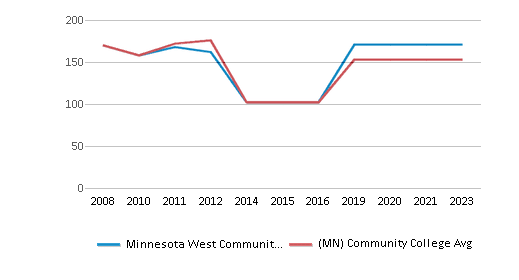
School Calendar
Student Body
The student population of Minnesota West Community and Technical College has grown by 36% over five years.
The student:teacher ratio of 27:1 has increased from 19:1 over five years.
The Minnesota West Community and Technical College diversity score of 0.44 is less than the state average of 0.63. The school's diversity has declined by 7% over five years.
Total Enrollment
4,653 students
2,555 students
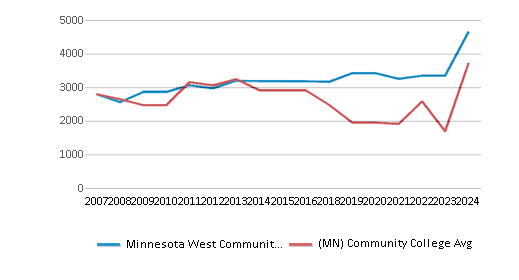
Student : Teacher Ratio
27:1
22:1
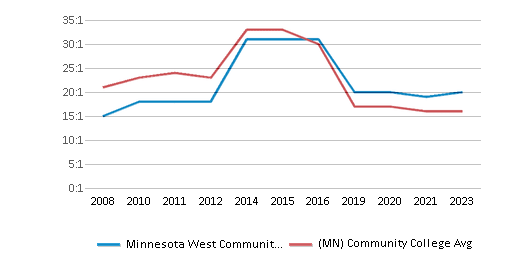
# Full-Time Students
1,050 students
915 students
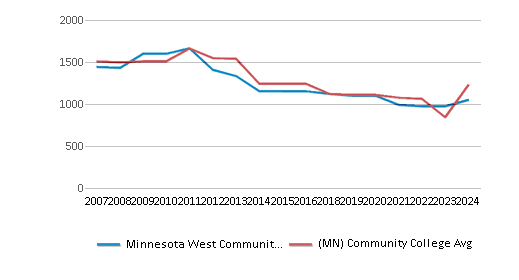
# Part-Time Students
3,603 students
1,808 students
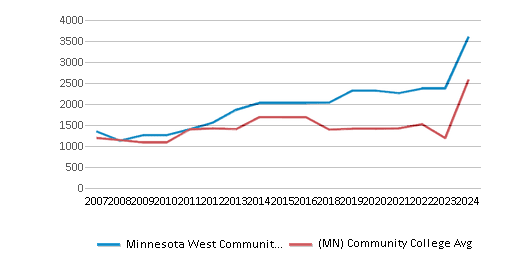
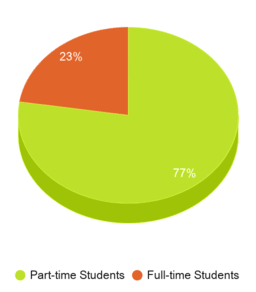
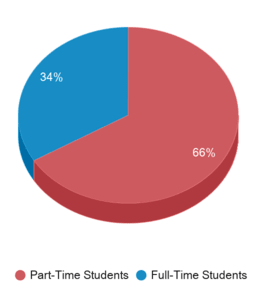
# Enrollment Undergraduate
465 students
372 students
# Full-Time Undergraduate Students
1,050 students
842 students
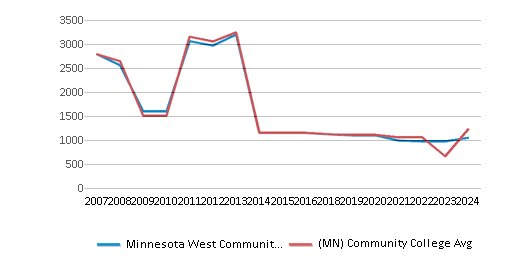
# Full-Time Graduate Students
n/a
38 students
# Part-Time Undergraduate Students
3,603 students
1,771 students
# Part-Time Graduate Students
n/a
12 students
Total Dormitory Capacity
14 students
116 students
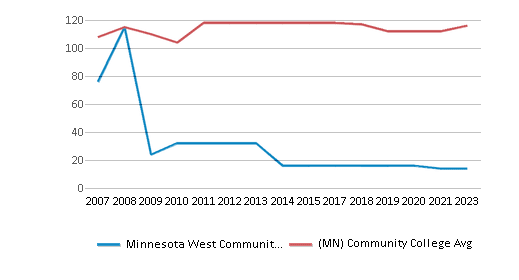
% American Indian/Alaskan
1%
1%
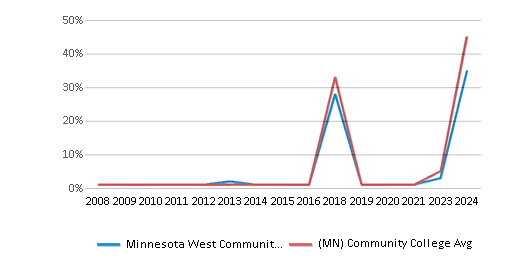
% Asian
2%
6%
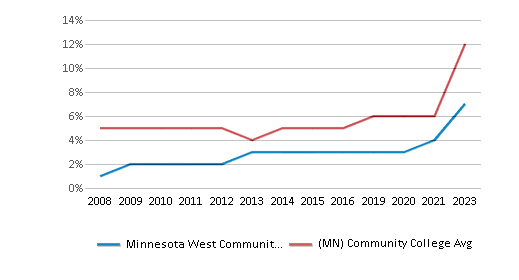
% Hispanic
11%
8%
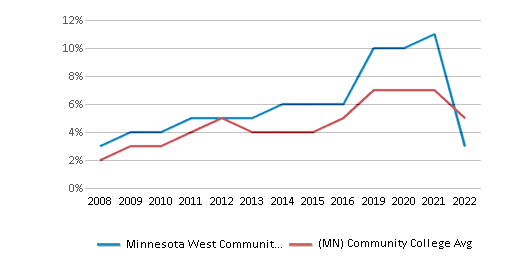
% Black
5%
15%
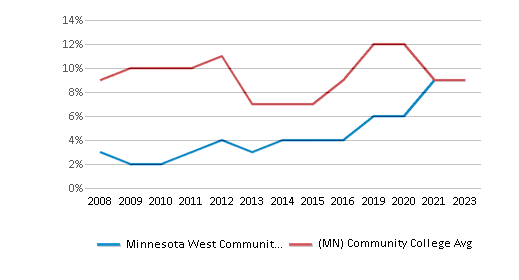
% White
74%
58%
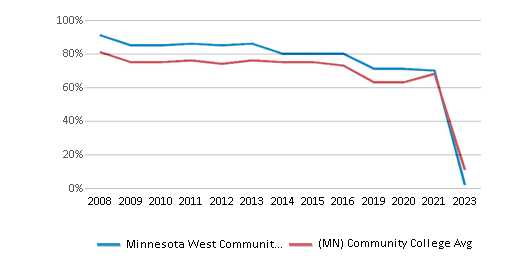
% Hawaiian
n/a
1%
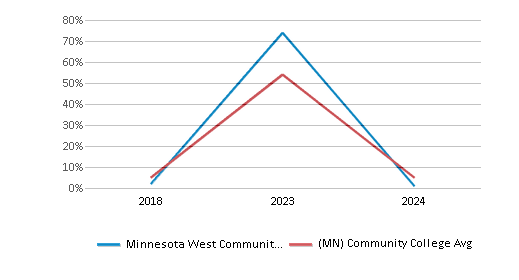
% Two or more races
2%
4%
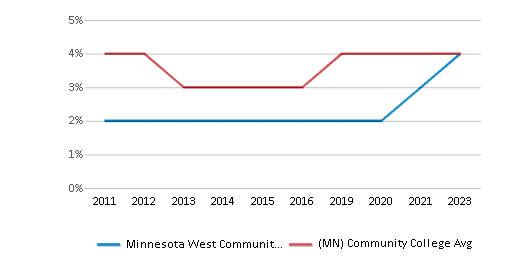
% Non Resident races
1%
1%
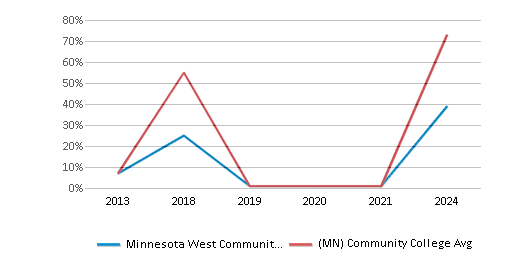
% Unknown races
5%
6%
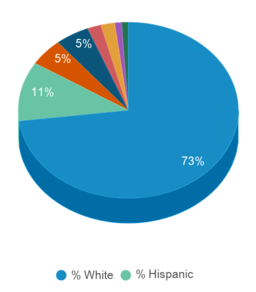
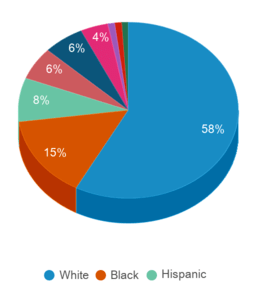
Diversity Score
0.44
0.63
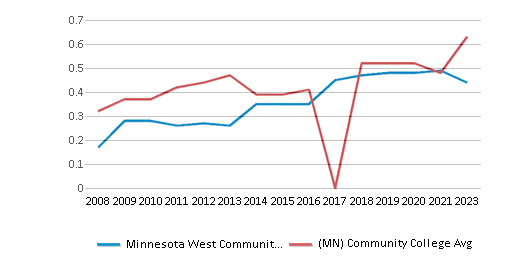
College Completion Rate (Students who graduate in less than 4 years)
0.3746%
0.3421%
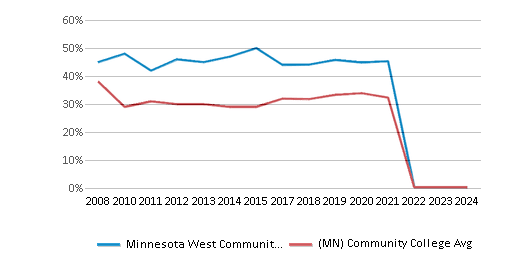
College Completion Rate (Students who graduate in 4 years or more than 4 years)
n/a
0.5652%
Average Graduate Earnings (10 Years)
$35,400
$36,900
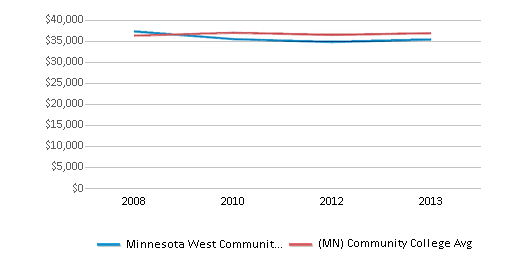
Tuition and Acceptance Rate
The public in-state tuition of $5,660 is more than the state average of $5,489. The in-state tuition has stayed relatively flat over four years.
The public out-state tuition of $10,807 is more than the state average of $6,145. The out-state tuition has stayed relatively flat over four years.
In-State Tuition Fees
$5,660
$5,489
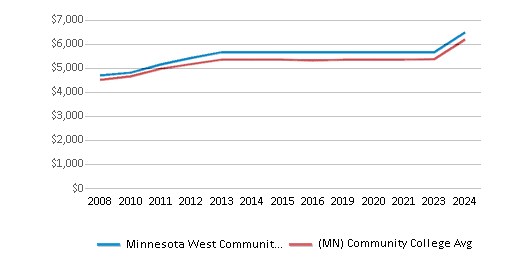
Out-State Tuition Fees
$10,807
$6,145
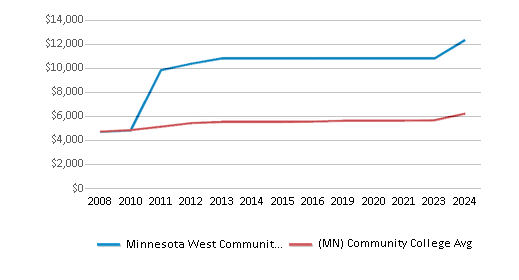
% Students Receiving Some Financial Aid
81%
89%
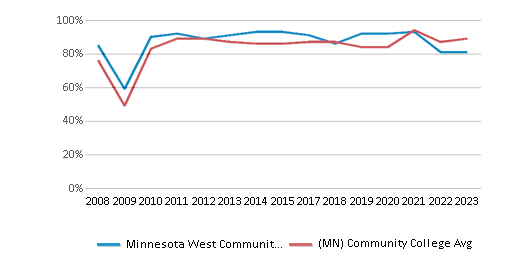
Median Debt for Graduates
$10,900
$12,264
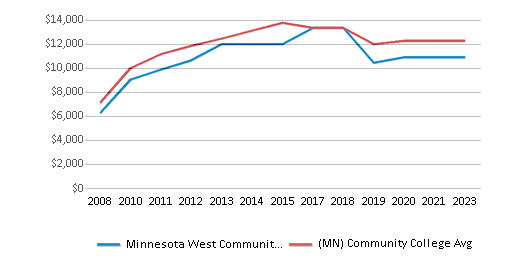
Median Debt for Dropouts
$7,750
$6,747
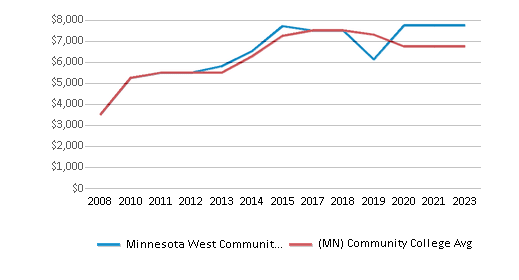
Acceptance Rate
n/a
94%
SAT Reading
n/a
625
SAT Math
n/a
600
SAT Writing
n/a
565
ACT Composite
n/a
24
ACT English
n/a
24
ACT Math
n/a
23
ACT Writing
n/a
8
Source: 2024 (or latest year available) Integrated Postsecondary Education Data System (IPEDS) , School Administrators
School Notes
- Minnesota West Community and Technical College is a comprehensive community and technical college with five southwestern Minnesota campuses: Canby, Granite Falls, Jackson, Pipestone, and Worthington. Minnesota West provides students with the opportunity to earn an Associate Degree, Diploma, or Certificate. Minnesota West Community and Technical College is a consolidated community/technical college formed on January 1, 1997 when Southwestern Technical College and Worthington Community College merged. The four technical campuses, Canby, Granite Falls, Jackson, and Pipestone began as local area vocational schools in the 1960s. They officially merged to become Southwestern Technical College in 1985. The Granite Falls Campus of Minnesota West prides itself on a quality education with accessibility for many different types of students. Our campus meets the needs of the workforce and community by providing many online, technical, and liberal art courses. Whether a student wants to complete a few courses and transfer or earn a degree, the Granite Falls campus has variety of educational options. Minnesota West is a leader in the state and the upper Midwest in Renewable Energy and Computerized Manufacturing. Our safe, attractive and friendly city, set in the beautiful Minnesota River Valley, prides itself on a small town atmosphere, friendly residents, and scenic views. While in Granite Falls you will have the opportunity to experience fine shopping and excellent customer service in either our quaint downtown, located on the West bank of the Minnesota River or along Highway 212. Be sure to stop at the Kilowatt Community Center and Prairie's Edge Casino and Resort. Minnesota West Community and Technical College is a member of the Minnesota State Colleges and Universities System, which consists of 34 state universities, community and technical colleges. The College is accredited by the Higher Learning Commission.
Frequently Asked Questions
How much does Minnesota West Community and Technical College cost?
Minnesota West Community and Technical College's tuition is approximately $5,660 for In-State students and $10,807 for Out-State students.
What is Minnesota West Community and Technical College's ranking?
Minnesota West Community and Technical College ranks among the top 20% of community college in Minnesota for: Least debt for graduating students.
Recent Articles

Obtaining Your Bachelor's Degree at a Community College
Explore the evolving landscape of community colleges offering bachelor's degrees, addressing affordability, accessibility, and workforce needs.

A to Z of Community College Certificates and Courses
From business and healthcare to technology and skilled trades, the article showcases the breadth of options available to students seeking to enhance their knowledge, develop new skills, or pursue career advancement.

What is a Community College?
This comprehensive guide explains what a community college is, its history, and its role in higher education. It covers the types of programs offered, differences from four-year colleges, benefits of attending, and important considerations for prospective students, providing valuable insights for those exploring educational options.








